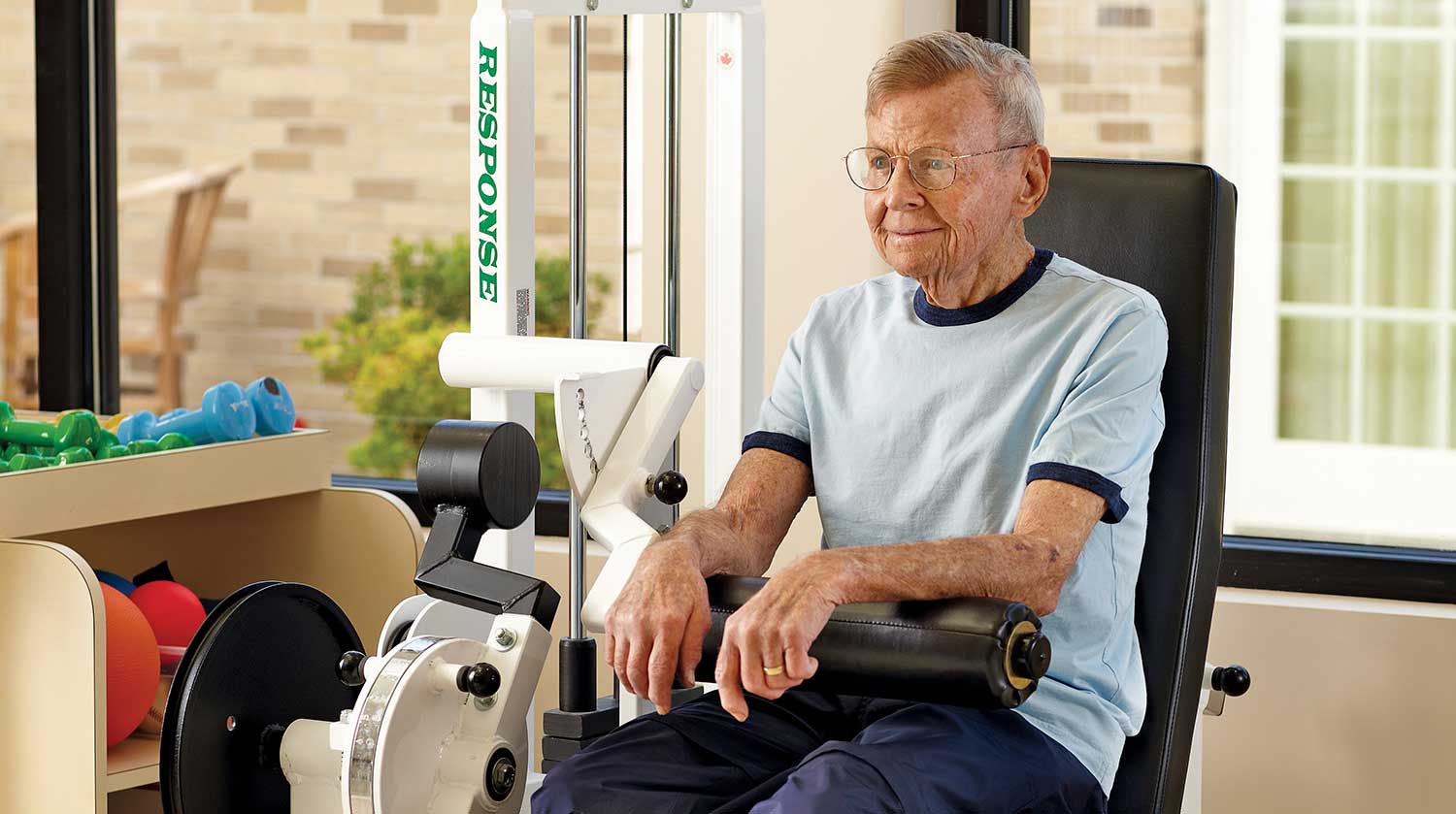Skilled nursing care and support is required for all types of admissions and stays at The Maplewood whether they are short or long stays. It is the rehabilitation stays that have changed the most significantly in recent years.
The Maplewood has always provided excellent therapy, nursing care and support services for rehabilitation residents. The common characteristics of the rehabilitation referrals were primarily people choosing elective surgery to replace or repair a joint such as a knee or hip. These patients would arrive at The Maplewood after a three-day hospital stay and would begin a rigorous restorative therapy program. The progress would be swift and medically uncomplicated. The resident would reach a maintenance level of therapy having reached the therapy goals for both physical therapy and occupational therapy and would then be discharged to home. A certified home care agency would provide a short period of support in the home as the patient transitioned back to their home setting.
The Changing Nature of Rehabilitation Stays
Over the past several years, the insurance coverage after surgery for restorative therapy has changed dramatically. Therefore many of the patients that previously came directly to a skilled nursing facility prior to going home are now going home with therapy and support services in the home. This transition, although limiting some patient’s options for therapy, has meant that many of the very short- and medically-straightforward therapy treatments happen in the home setting rather than the skilled nursing environment.
This has opened up the opportunity for more complex rehabilitation stays at The Maplewood. The characteristics of these referrals may include: those who have had a stroke, cardiac surgery, multiple physical injuries, and co-morbidities (multiple medical diagnosis). These co-morbidities may be any combination of medical conditions such as the following: diabetes, coronary artery disease, renal failure, cancer, respiratory issues, cognitive issues, dementia and hypertension. This has resulted in a more comprehensive review of referrals to assess for skilled nursing and medical needs prior to a patient’s stay at The Maplewood.
It Starts with a Referral – The Review Process
When a referral is sent to The Maplewood the first clinical person to review the referral is the Social Worker. The Social Worker reviews the information to assess the type of rehabilitation the person may need, the potential length of stay and the types of the support that may be needed throughout the stay. The Social Worker is looking at specific concerns that may require Social Work support during the stay in order to enhance success and comfort for the resident. These may include length of hospital stay, age of resident, family support, frequency of hospitalizations, mental health diagnosis and potential place of discharge after the restorative rehabilitation stay.
Since most of the referrals also have complex medical issues that need to be delicately monitored throughout the stay, the referral packet is also reviewed by nursing administration. As they review the referrals, they are assessing for the types of medical and nursing care and equipment needs that the person will need during their stay.
Based on the patient’s level of physical ability in the hospital and their other medical conditions, the physical therapist may also review the referral prior to The Maplewood accepting the referral.
The Maplewood philosophy is to be able to accept referrals and be proactive in order to provide exceptional care from the moment the person arrives at our skilled nursing facility. This thorough assessment prior to admission will ultimately result in successful treatment and care during a rehabilitation stay. This practice is a commitment to excellent care and a best practice standard.
After the referral has been thoroughly reviewed by the appropriate professionals the patient is accepted for admission. The patient is then discharged from the hospital and comes to The Maplewood for restorative therapy services.
Rehabilitation Care at The Maplewood – An Interdisciplinary Approach
When the patient arrives at The Maplewood for rehabilitation, multiple disciplines meet with and assess the patient from the moment they arrive. Nursing, therapy, social work and dietary are the first to meet with the patient and family members (if appropriate), to gather additional important information such as specific medical information not yet received through the clinical referral, daily routine and personal preferences. All of these clinical discipline assessments are important as the resident becomes adjusted to a new setting and the therapy process. Then, during their stay, the patient will also meet with the activity staff. The business office will also meet with the patient to discuss insurance coverage and answer any questions the patient or family may have regarding coverage.
Social Work
Since rehabilitation patients may have multiple clinical and support needs while at The Maplewood, various departments provide enhanced support and monitoring during the stay and also while preparing for discharge to the community. The Social Worker will include the certified home care agency in communications from the very beginning of the rehabilitation stay, whereas in the past the initial contact may have been closer to the discharge date to return to the community. The home care discharge coordinator will be invited to the care conference and the Social Worker will also network between the home care agency and the nursing and therapy departments at The Maplewood. In addition, the Social Worker provides ongoing, support, reassurance and comfort to the patient and their families or caregivers as they may experience emotional challenges during the stay.
Nursing
The nursing department will network with the patient’s primary care doctor if there are aspects of the care that need more specific background information such as immunizations, recent diagnosis and treatment. The nurses also stay current regarding the resident’s medical status regarding any other medical concerns or issues and therapy progress. They are continually communicating with the nurse practitioners and primary physician at The Maplewood regarding skilled nursing and medical needs. They also provide emotional support and caring to the resident in conjunction with nursing care and treatment.
Therapy
The therapy staff has a major role in the success of treatment for rehabilitation patients. They assess each person regarding their physical status and all of their physical limitations, conditions and cognitive abilities. They develop a personalized program of treatment that promotes progress and success as they encourage, motivate and coach the patient through the process. Previously, traditional rehabilitation stays were approximately 7-10 days depending on the type of elective surgery. Currently, the more complex rehabilitation stays require a longer and more comprehensive approach in order to reach the same level of success for the patient.
Discharge Planning
When the patient reaches the maintenance level of therapy then the patient is transitioned back home to the community with home care services. This transition involves multiple disciplines; nursing, therapy, dietary and social work as information, recommendations and medical community networking is done in preparation for the discharge. This promotes a smooth transition to the community for the patient whether it’s to the same environment or to a more supportive one.
The commitment that The Maplewood has to its approach to complex rehabilitation admission is another reason why The Maplewood is the premiere skilled nursing long-term care and rehabilitation facility in the Rochester, New York area.



